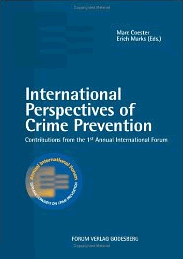For Urban Crime Prevention in Sub-Sahara: United Nations Crime Prevention Guidelines at work
Prof. Dr. Slawomir Redo
United Nations Office on Drugs and Crime - UNODC,
Sub-Saharan Africa experiences the highest proportion of youth and a very radical drop of labour market opportunities for the youth of 15–19 years of age, especially men. It has also the fastest urbanizing rate of all continents. Marginalization, social exclusion and crime create urban insecurity. Consequently, crime is a major constraint on investment, for it contributes to the low investor confidence. In effect, there is the highest rate of capital flight in the world.
In the Sub-Saharan countries, the criminal justice systems are poorly adapted to the rapidly changing urban environment and in most cases unable to respond to the concerns and needs of urban dwellers especially the poor and marginalized, hence enable to contribute to the revitalization of business and community life and to upholding the rule of law. Various United Nations crime prevention and criminal justice instruments create the strategic framework in which the rule of law and crime prevention should operate. The presentation envisages how through a technical assistance project Sub-Saharan countries may develop urban crime prevention strategies as a part of responsibility of all Governments to create, maintain and promote a context within which relevant institutions and all segments of civil society, including family, school, community and the corporate sector, can better play their part in breaking the
In the Sub-Saharan countries, the criminal justice systems are poorly adapted to the rapidly changing urban environment and in most cases unable to respond to the concerns and needs of urban dwellers especially the poor and marginalized, hence enable to contribute to the revitalization of business and community life and to upholding the rule of law. Various United Nations crime prevention and criminal justice instruments create the strategic framework in which the rule of law and crime prevention should operate. The presentation envisages how through a technical assistance project Sub-Saharan countries may develop urban crime prevention strategies as a part of responsibility of all Governments to create, maintain and promote a context within which relevant institutions and all segments of civil society, including family, school, community and the corporate sector, can better play their part in breaking the
| Figure - Three models (English, PDF) | |
| Six United Nations guiding principles. (English, PDF) | |
| Table 1: Rule of law in selected countries (English, PDF) |


